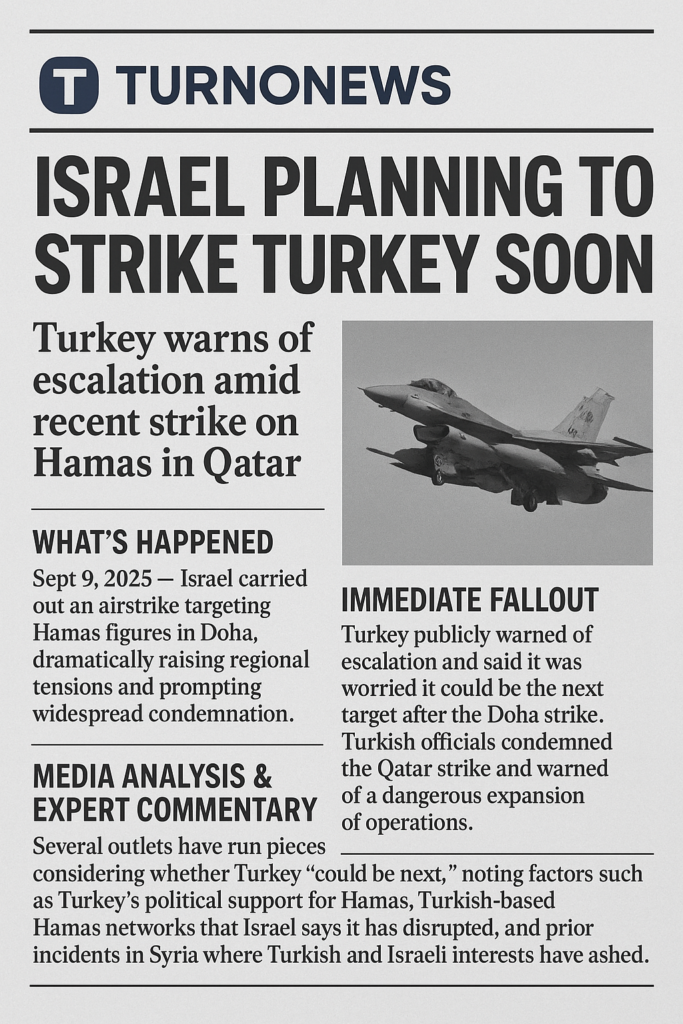Jai Siya Ram
Short answer: There’s no public, verifiable evidence that Israel has already decided to “strike Turkey soon.” What’s happening is a sharp escalation of rhetoric and concern after Israel’s strike on a Hamas meeting in Doha (early September 2025), and Turkish officials and many outlets are warning Ankara could be at risk — but reporting so far describes fears, warnings, and analysis, not a confirmed Israeli plan to attack Turkish territory.
What’s happened (timeline & context)
- Sept 9, 2025 — Israeli strike in Doha: Israel carried out an airstrike that targeted Hamas figures in Doha. That attack dramatically raised regional tensions and prompted wide condemnation. Reuters and analysis pieces place this strike at the center of the current escalation.
- Immediate fallout: Turkey — a vocal supporter of the Palestinians under President Erdoğan — publicly warned of escalation and said it was worried it could be the next target after the Doha strike. Turkish officials (including the Defense Ministry spokesman Rear Adm. Zeki Aktürk) condemned the Qatar strike and warned of dangerous expansion of operations. AP, Washington Post and Turkish outlets reported Ankara’s warnings.
- Media analysis & expert commentary: Several outlets (SCMP, Haaretz, Ynet, i24) have run pieces considering whether Turkey “could be next,” noting factors such as: Turkey’s political support for Hamas, Turkish-based Hamas networks that Israel says it has disrupted, and prior incidents in Syria where Turkish and Israeli interests have clashed. These are assessments — not documentary proof of an imminent Israeli strike on Turkish soil.
What reporters and analysts say (key claims and caveats)
- Claim: Turkish authorities fear they might be targeted next. Supported by: Turkish government statements and reporting. (Fact: confirmed).
- Claim: Israel is willing to strike Hamas “wherever they are” (Netanyahu/Katz rhetoric). Supported by: Israeli officials’ public statements after the Doha attack. (Fact: confirmed rhetoric/intent to pursue Hamas outside Gaza.)
- Caveat/Analyst view: Western analysts generally call a full-scale Israeli strike on Turkey unlikely (because Turkey is a significant regional military power and NATO member), though they don’t rule out limited operations against Hamas targets inside Turkey or cross-border actions in nearby Syria. (Assessment, not confirmation.)
- Security context: Israeli security services have reported thwarting Turkey-based Hamas cells in the past; these counterterror claims are used in press analysis to explain Israeli concern about threats emanating from Turkish territory. (Contextual fact reported by security outlets / opinion pieces.)
What isn’t supported by credible reporting
- There are no reputable news reports from international agencies (Reuters / AP / major newspapers) publishing verified intelligence, leaked orders, or government declarations that Israel has scheduled or launched an attack on Turkish territory. Viral social posts and some opinion pieces speculate heavily — treat those with caution. (Example: short-form social posts and reels amplify fears but don’t substitute for verification.)
Bottom line (my assessment, grounded in sources)
- Short-term: Heightened risk of incidents and wider regional escalation is real. Turkish warnings and Israeli rhetoric raise the probability of clashes (diplomatic, cyber, proxy or limited military actions), but an outright, state-on-state Israeli strike on Turkey is not confirmed and would be a major strategic leap that most analysts call unlikely.
What to watch next (concrete, datable signals)
- Official statements from Israel’s Prime Minister/Defense Ministry or Turkey’s Presidency/Defense Ministry that go beyond rhetoric (dates & text).
- Changes in force posture: Movement of Israeli forces toward Turkey/Syria airspace or publicly declared no-fly zones.
- Allied responses: NATO / U.S. statements about Turkey’s security (NATO involvement would materially change the situation). Reuters/AP will publish these quickly.
- Verified intelligence leaks (rare and should be cross-checked across Reuters/AP/WSJ/FT) — these would be the first place a real operational plan would appear.


